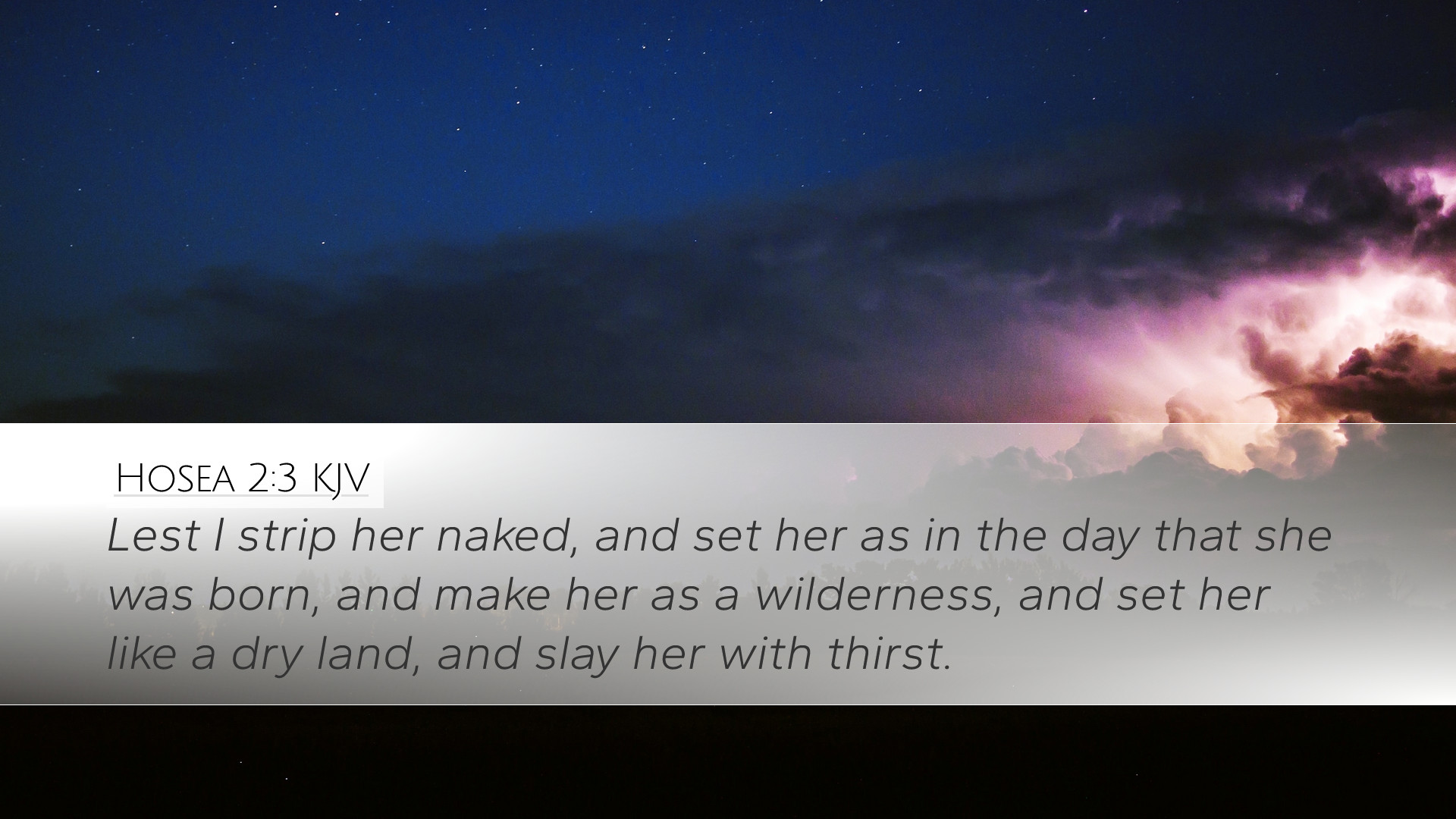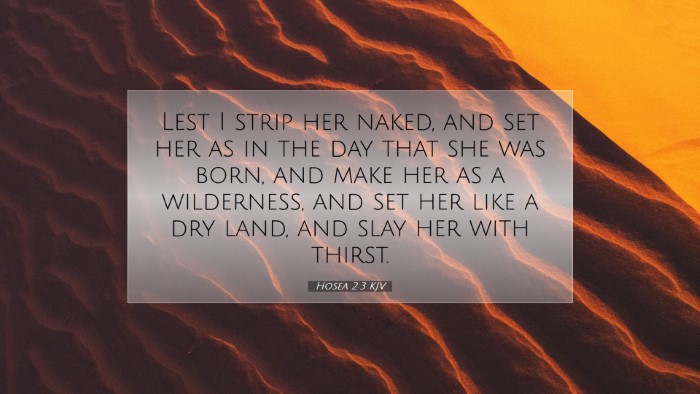Old Testament
Genesis Exodus Leviticus Numbers Deuteronomy Joshua Judges Ruth 1 Samuel 2 Samuel 1 Kings 2 Kings 1 Chronicles 2 Chronicles Ezra Nehemiah Esther Job Psalms Proverbs Ecclesiastes Song of Solomon Isaiah Jeremiah Lamentations Ezekiel Daniel Hosea Joel Amos Obadiah Jonah Micah Nahum Habakkuk Zephaniah Haggai Zechariah MalachiHosea 2:3
Hosea 2:3 KJV
Lest I strip her naked, and set her as in the day that she was born, and make her as a wilderness, and set her like a dry land, and slay her with thirst.
Hosea 2:3 Bible Commentary
Bible Commentary on Hosea 2:3
Verse: "Lest I strip her naked, and set her as in the day that she was born, and make her as a wilderness, and set her like a dry land, and slay her with thirst."
Introduction
This verse from Hosea encapsulates God's profound relationship with Israel and the consequences of their unfaithfulness. The prophetic language used here bears a weight of judgment, yet it also conveys the hope for restoration. By drawing from the insights of renowned Bible commentators like Matthew Henry, Albert Barnes, and Adam Clarke, we can deepen our understanding of the themes of judgment, renewal, and divine love inherent in this passage.
Exegesis of Hosea 2:3
In order to understand the complexities of Hosea 2:3, we must consider the context in which Hosea prophesied. The northern kingdom of Israel was embroiled in idolatry and moral decay, seeking fulfillment apart from God, which led to an impending judgment.
Divine Judgment
Matthew Henry highlights that the metaphor of being stripped naked signifies the utter removal of all comforts and securities that Israel had placed their hope in. This aligns with the historical context wherein Israel's idolatry led to spiritual nakedness, manifesting as a loss of God's protective presence.
Henry further indicates that God’s intention to "make her as a wilderness" signifies a state of desolation. The starkness of a wilderness paints a vivid picture of spiritual barrenness resulting from the people’s infidelity. Here, the wilderness represents a place void of sustenance, paralleling Israel's disconnection from their life-giving relationship with God.
Symbolism of Thirst
Albert Barnes elaborates on the phrase "slay her with thirst." In biblical literature, thirst often symbolizes a deep spiritual longing for communion with God. The absence of water, a vital necessity, signifies Israel’s estrangement from God, who is their source of life and sustenance. This imagery convicts the reader to recognize the consequences of forsaking God.
God's Discipline as Part of Restoration
Adam Clarke provides valuable insights regarding the disciplinary nature of God’s actions. He posits that the stripping away of Israel's comforts, while severe, is an effort to awaken them to their dire condition. The intention behind God's judgment is restorative; it seeks to lead them back to repentance and towards a renewed relationship with Him. Clarke reflects on God’s loving nature, suggesting that such divine discipline, though painful, is necessary for spiritual awakening.
Theological Themes
This verse reflects several critical theological themes that deserve further examination:
- The Nature of God's Judgment: God's judgment is not arbitrary but rather stems from deep love and righteousness. He aims to bring about awareness and repentance.
- Spiritual Desolation: The imagery of wilderness and thirst reinforces the consequences of sinful choices and the resulting alienation from God.
- Hope for Restoration: Though judgment is pronounced, the overarching narrative of Hosea points towards hope. God’s ultimate desire is not destruction but reconciliation.
Application for Today
For pastors, theologians, and students of the Bible, Hosea 2:3 serves as a stark reminder of the consequences of spiritual infidelity. In contemporary settings, where many may similarly neglect their relationship with God, this scripture warns against the desolation that can ensue from such choices.
This passage can inspire believers to evaluate their spiritual lives critically. Are there areas where they seek satisfaction outside of God? Are they aware of the spiritual thirst that unfaithfulness creates? Addressing these questions can lead to meaningful self-reflection and renewed commitment to God.
Conclusion
Hosea 2:3, while a message of impending judgment, is rich with implications for understanding God's character. Through the blend of human frailty and divine love depicted in this verse, we are reminded of the balance between justice and mercy. Commentary insights illuminate the text, leading us to anticipate the restoration that follows a humble return to God.


